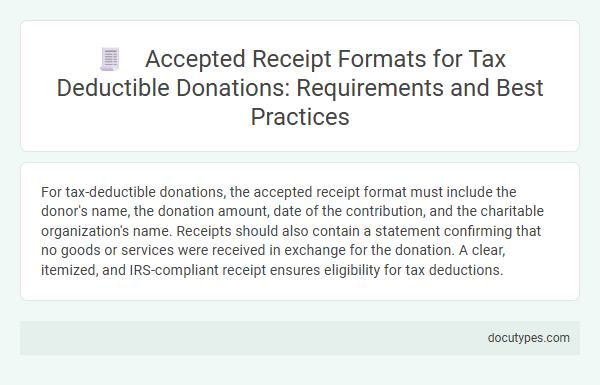For tax-deductible donations, the accepted receipt format must include the donor's name, the donation amount, date of the contribution, and the charitable organization's name. Receipts should also contain a statement confirming that no goods or services were received in exchange for the donation. A clear, itemized, and IRS-compliant receipt ensures eligibility for tax deductions.
Introduction to Tax Deductible Donation Receipts
A tax deductible donation receipt is a crucial document for claiming deductions on your charitable contributions. It must include specific details such as the donor's name, donation amount, date of the contribution, and the organization's information. Your receipt should comply with tax authority requirements to ensure acceptance and eligibility for tax benefits.
Importance of Proper Receipt Formats
Receipts for tax-deductible donations must follow specific format guidelines set by tax authorities to ensure validity. Proper receipt formats include essential details such as the donor's name, donation date, amount, and the organization's tax-exempt status. You increase the chances of successful tax deductions by providing correctly formatted receipts that meet regulatory requirements.
Essential Information Required on Donation Receipts
Receipts for tax-deductible donations must include specific essential information to be accepted by tax authorities. This ensures your contribution is properly documented for tax purposes.
The receipt should clearly state the donor's name, the date of the donation, and the exact amount contributed. It must also include the official name and registration number of the charity. A statement confirming that no goods or services were provided in exchange for the donation is often required.
Acceptable Digital and Paper Receipt Formats
| Receipt Format Accepted for Tax Deductible Donations | |
|---|---|
| Paper Receipt Formats |
Official donation receipts must include the organization's name, donation amount, date, and a unique identifier. Acceptable paper formats include:
|
| Digital Receipt Formats |
Digital receipts are widely accepted if they comply with tax authority guidelines and verify donation authenticity. Common acceptable digital formats include:
|
| Key Receipt Information Required |
For tax purposes, your receipt should contain:
|
| Accepting either paper or digital receipt formats ensures that your tax deductible donation is properly documented and recognized by tax authorities. | |
IRS and Local Regulatory Requirements
What receipt format is accepted for tax deductible donations according to IRS and local regulatory requirements? The IRS mandates that receipts must include the donor's name, the amount donated, the date of the donation, and a statement confirming whether any goods or services were provided in exchange. Local regulations may require additional details, such as the organization's tax identification number or a description of donated items.
Common Mistakes to Avoid in Donation Receipts
Donation receipts must include specific details to be accepted for tax-deductible purposes. Key elements include the donor's name, the date of the donation, the amount donated, and the charity's official information.
Common mistakes in donation receipts involve missing or incorrect donor information and failing to provide a clear statement of whether any goods or services were received in exchange. Ensuring accuracy in these areas helps maintain the receipt's validity for tax deductions.
Best Practices for Charitable Organizations
Receipts for tax deductible donations must comply with specific guidelines to ensure acceptance by tax authorities. Charitable organizations play a critical role in providing properly formatted receipts to donors for their records.
- Include donor's name and donation amount - Accurate identification and donation details are essential for validation by tax agencies.
- Specify the date and nature of the donation - Clear documentation supports the legitimacy of the contribution and the recipient organization.
- Display the charity's registration number - Proof of the organization's official status is required for tax deduction eligibility.
Your receipt format should follow these best practices to maintain compliance and support donor claims.
Sample Templates for Donation Receipts
Tax-deductible donations require specific receipt formats to ensure compliance with tax regulations. Sample templates for donation receipts help standardize the information presented for verification and record-keeping purposes.
- Basic Receipt Template - Includes donor name, donation amount, date, and organization details to meet IRS requirements.
- Detailed Receipt Template - Lists the donated items along with estimated values and acknowledgment statements for non-cash contributions.
- Electronic Donation Receipt - Provides an email format with secure verification codes and digital signatures for online donations.
Recordkeeping and Audit Preparation
Receipts for tax-deductible donations must meet specific format criteria to ensure they are valid for recordkeeping and audit purposes. Proper documentation supports accurate tax reporting and facilitates smooth verification during audits.
- Detailed Donor Information - The receipt must include the donor's name and address to confirm the source of the donation.
- Donation Description - It should clearly describe the donated item or cash amount, specifying the date of the contribution.
- Official Charity Details - The receipt must display the charity's name, registration number, and an authorized signature to verify legitimacy.
What Receipt Format Is Accepted for Tax Deductible Donations? Infographic

